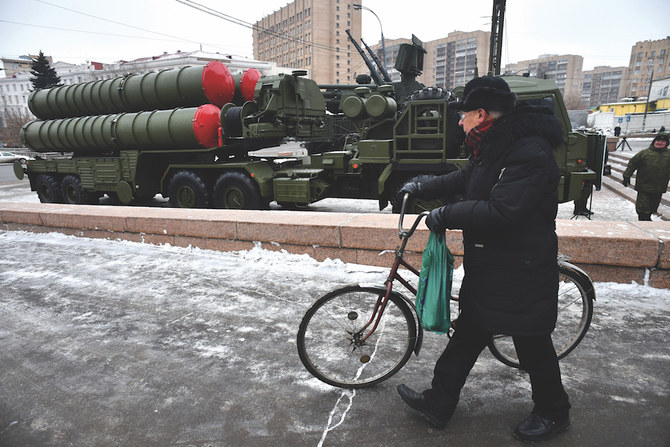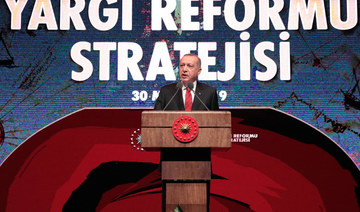ISTANBUL: Turkey is on the cusp of facing US sanctions over its decision to buy a Russian S-400 missile defense system, leaving its already soft currency and economy vulnerable and raising questions over its position within NATO and the region.
If no solution is found in coming weeks and US-Turkish tensions continue to worsen, tit-for-tat sanctions could hit trade between the allies and prolong a recession in Turkey that has already tested President Tayyip Erdogan’s grip on power.
Turkey also risks being rapidly cut out of the production and use of American F-35 fighter jets, which could mark a step toward a re-evaluation of its 67-year membership in the North Atlantic Treaty Organization.
“It’s very complex to resolve because both US and Turkish officials see this as a reflection of a larger geo-political balancing,” said Galip Dalay, visiting scholar at the University of Oxford’s politics and international relations department.
“Sanctions would have a very consequential effect on Turkey, but probably not mark a breaking point in its US relationship,” he said.
Ankara and Washington have squabbled for months over the Turkish plan to buy the S-400s, which the United States says is incompatible with the Western alliance’s defense network and poses a threat to the F-35s that Turkey also plans to buy.
Turkey says defending its territory poses no threat to allies, and stresses it has met all NATO obligations.
Both sides are entrenched even while they have repeated a desire to avoid so-called CAATSA sanctions, which by US law would be triggered when the Russian anti-aircraft weapon arrives on Turkish soil, possibly as soon as July.
An agreement to delay shipment of the S-400s could still open the door to US President Donald Trump convincing Erdogan to turn his back on what the Turkish leader has repeatedly called a “done deal” with Russia.
The pair agreed on Wednesday to meet on the sidelines of a G-20 conference on June 28-29.
Yet Ankara’s ties with Moscow have been strengthening, and Turkey’s defense minister said last week Turkish military personnel were in Russia for S-400 training. In response, the United States is considering halting the training of Turkish pilots on F-35 stealth fighters in Arizona.
The showdown comes as the Russia-backed Syrian army escalates an assault on some Turkish-backed rebels near Turkey’s border. More broadly in the Middle East, the United States is ramping up pressure on Turkey and other nations to isolate Iran including blocking all Iranian oil exports.
“If the US sanctions are bad, Turkey could reconsider its decision to comply with US sanctions on Iran,” said Dalay.
’PATH TO ESCALATION’
Washington wants Ankara to buy its alternative Patriot surface-to-air missile batteries and has made an offer that expires on June 4, according to a person familiar with the matter.
If Ankara accepts delivery of the S-400s as planned, the US Congress has moved to block delivery of F-35s to Turkey and remove it from the list of nations working together to build them.
The delivery would also force Trump to select five of 12 possible sanctions under the Countering America’s Adversaries Through Sanctions Act, or CAATSA, which targets purchases of military equipment from NATO foe Russia.
The sanctions range from banning visas and denying access to the US-based Export-Import Bank, to the harsher options of blocking any transactions with the US financial system and denying export licenses.
Trump may initially choose milder options targeting individual Turks rather than the government, a decision that could buy time for more diplomacy even while it may prompt Congress to separately impose tougher sanctions.
“There is a US reticence to completely block the military-industrial relationship with Turkey,” said Sinan Ulgen, a former Turkish diplomat and a visiting scholar at Carnegie Europe in Brussels.
Yet US sanctions of any sort would likely hammer the Turkish lira, which has shed 14% of its value against the dollar this year in part due to fraying US ties.
Last year, a separate set of US sanctions and tariffs over a jailed US pastor helped set off a currency crisis that knocked 30% off the lira, tipped Turkey into recession and rattled emerging markets around the world.
Ratings agency Moody’s said this month that Turkey’s political risk is “high” and warned that the S-400s could trigger not only US but also NATO sanctions.
Turkey has a track record of responding in kind to foreign sanctions and tariffs.
Ulgen said any sanctions dispute could escalate into tariffs that harm US-based Lockheed Martin Corp’s business with Turkish industrial companies, and even threaten future upgrades to Turkey’s existing fleet of F-16 jets.
“Heavier sanctions could follow if the United States finds itself on a path to escalation with Turkey, beyond the usual rhetoric,” he said.
How US sanctions over a Russian weapon could rattle Turkey
How US sanctions over a Russian weapon could rattle Turkey

- Turkey’s decision to buy Russian missile defense system has left its already soft currency and economy vulnerable
- The tit-for-tat sanctions may damage trade and the dispute could prolong Turkey’s recession
Open Forum Riyadh to discuss digital currency, AI, and mental health

- The event will run in parallel to the WEF’s Special Meeting on Global Collaboration
LONDON: The Open Forum Riyadh — a series of public sessions taking place in the Saudi capital on Sunday and Monday — will “spotlight global challenges and opportunities,” according to the organizers.
The event, a collaboration between the World Economic Forum and the Saudi Ministry of Economy and Planning, will run in parallel to the WEF’s Special Meeting on Global Collaboration, Growth and Energy for Development, taking place in Riyadh on April 28 and 29.
“Under Saudi Vision 2030, Riyadh has become a global capital for thought leadership, action and solutions, fostering the exchange of knowledge and innovative ideas,” Faisal F. Alibrahim, Saudi minister of economy and planning, said in a press release, adding that this year’s Open Forum being hosted in Riyadh “is a testament to the city’s growing influence and role on the international stage.”
The forum is open to the public and “aims to facilitate dialogue between thought leaders and the broader public on a range of topics, including environmental challenges, mental health, digital currencies, artificial intelligence, the role of the arts in society, modern-day entrepreneurship, and smart cities,” according to a statement.
The agenda includes sessions addressing the impact of digital currencies in the Middle East, the role of culture in public diplomacy, urban development for smart cities, and actions to enhance mental wellbeing worldwide.
The annual Open Forum was established in 2003 with the goal of enabling a broader audience to participate in the activities of the WEF, and has been hosted in several different countries, including Cambodia, India, Jordan and Vietnam.
The panels will feature government officials, artists, civil-society leaders, entrepreneurs, and CEOs of multinationals.
This year’s speakers include Yazeed A. Al-Humied, deputy governor and head of MENA investments at the Saudi Pubic Investment Fund; Princess Reema Bandar Al-Saud, Saudi Arabia’s ambassador to the US; and Princess Beatrice, founder of the Big Change Charitable Trust and a member of the British royal family.
Michele Mischler, head of Swiss public affairs and sustainability at the WEF, said in a press release that the participation of the public in Open Forum sessions “fosters diverse perspectives, enriches global dialogue, and empowers collective solutions for a more inclusive and sustainable future.”
Meituan looks to hire in Saudi Arabia, indicating food delivery expansion

SHANGHAI: Chinese food delivery giant Meituan is seeking to hire staff for at least eight positions based in Riyadh, in a sign it may be looking to Saudi Arabia to further its global expansion ambitions, according to Reuters.
The jobs ads, which is hiring for KeeTa, the brand name Meituan uses for its food delivery operations in Hong Kong, is seeking candidates with expertise in business development, user acquisition, and customer retention, according to posts seen by Reuters on Linkedin and on Middle Eastern jobs site Bayt.com.
Meituan did not immediately respond to a request for comment by Reuters on its plans for Saudi expansion.
Bloomberg reported earlier on Friday that the Beijing-based firm would make its Middle East debut with Riyadh as the first stop.
Since expanding to Hong Kong in May 2023, Meituan’s first foray outside of mainland China, speculation has persisted that its overseas march would continue as the firm searches for growth opportunities, with the Middle East rumored since last year to be one area of possible expansion.
“We are actively evaluating opportunities in other markets,“ Meituan CEO Wang Xing said during a post-earnings call with analysts last month.
“We have the tech know-how and operational know-how, so we are quietly confident we can enter a new market and find an approach that works for consumers there.”
IMF opens first MENA office in Riyadh

RIYADH: The International Monetary Fund has opened its first office the Middle East and North Africa region in Riyadh.
The office was launched during the Joint Regional Conference on Industrial Policy for Diversification, jointly organized by the IMF and the Ministry of Finance, on April 24.
The new office aims to strengthen capacity building, regional surveillance, and outreach to foster stability, growth, and regional integration, thereby promoting partnerships in the Middle East and beyond, according to the Saudi Press Agency.
Additionally, the office will facilitate closer collaboration between the IMF and regional institutions, governments, and other stakeholders, the SPA report noted, adding that the IMF expressed its appreciation to Saudi Arabia for its financial contribution aimed at enhancing capacity development in its member countries, including fragile states.
Abdoul Aziz Wane, a seasoned IMF director with an extensive understanding of the institution and a broad network of policymakers and academics worldwide, will serve as the first director of the Riyadh office.
Saudi minister to deliver keynote speech at Automechanika Riyadh conference

RIYADH: Saudi Arabia’s Deputy Minister of Investment Transaction Saleh Al-Khabti is set to deliver the keynote speech at a global automotive aftermarket industry conference in Riyadh.
Set to be held from April 30 April to May 2 in the Saudi capital’s International Convention and Exhibition Center, Automechanika Riyadh will welcome more than 340 exhibitors from over 25 countries.
Al-Khabti will make the marquee address on the first day of the event, which will also see participation from Aftab Ahmed, chief advisor for the Automotive Cluster at the National Industrial Development Centre, Ministry of Industry and Mineral Resources.
Saudi Arabia’s automotive sector is undergoing a transformation, with the Kingdom’s Public Investment Fund becoming the major shareholder in US-based electric vehicle manufacturer Lucid, and also striking a deal with Hyundai to collaborate on the construction of a $500 million-manufacturing facility.
Alongside this, Saudi Arabia’s Crown Prince Mohammed bin Salman launched the Kingdom’s first electric vehicle brand in November 2022.
Commenting on the upcoming trade show, Bilal Al-Barmawi, CEO and founder of 1st Arabia Trade Shows & Conferences, said: “It is a great honor for Automechanika Riyadh to be held under the patronage of the Saudi Arabian Ministry of Investment, and we’re grateful for their continued support as the event goes from strength-to-strength.
“The insights and support we’ve already received have been invaluable, and we look forward to continuing this relationship throughout the event and beyond.”
This edition of Automechanika Riyadh will feature seven product focus areas, including parts and components, tyres and batteries, and oils and lubricants.
Accessories and customizing, diagnostics and repairs, and body and paint will also be discussed, as well as care and wash.
Aly Hefny, show manager for Automechanika Riyadh, Messe Frankfurt Middle East, said: “The caliber of speakers confirmed to take part at Automechanika Riyadh is a testament to the event’s growth and prominence within the regional automotive market.
“We have developed a show that goes beyond the norm by providing a platform that supports knowledge sharing and networking while promoting the opportunity to engage with key industry experts and hear the latest developments, trends and innovations changing the dynamics of the automotive sector.”
Aramco-backed S-Oil expects Q2 refining margins to remain steady then trend upward

SEOUL: South Korea’s S-Oil forecast on Friday that second-quarter refining margins will be steady, supported by regular maintenance in the region, then trend upward in tandem with higher demand as the summer season gets underway, according to Reuters.
Over the January-March period, the refiner said it operated the crude distillation units at its 669,000-barrel-per-day oil refinery in the southeastern city of Ulsan at 91.9 percent of capacity, compared with 94 percent in October-December.
S-Oil, whose main shareholder is Saudi Aramco, plans to shut its No. 1 crude distillation unit sometime this year for maintenance, the company said in an earnings presentation, without specifying the time.


















